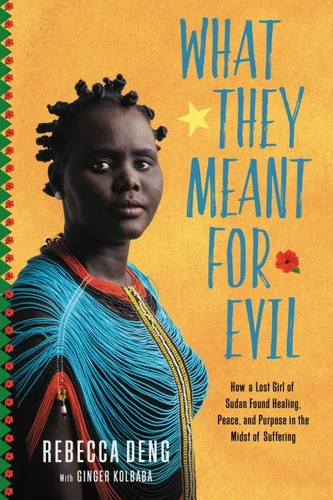What They Meant for Evil. How a Lost Girl of Sudan Found Healing, Peace, and Purpose in the Midst of Suffering
Par : ,Formats :
Disponible dans votre compte client Decitre ou Furet du Nord dès validation de votre commande. Le format ePub protégé est :
- Compatible avec une lecture sur My Vivlio (smartphone, tablette, ordinateur)
- Compatible avec une lecture sur liseuses Vivlio
- Pour les liseuses autres que Vivlio, vous devez utiliser le logiciel Adobe Digital Edition. Non compatible avec la lecture sur les liseuses Kindle, Remarkable et Sony
- Non compatible avec un achat hors France métropolitaine
 , qui est-ce ?
, qui est-ce ?Notre partenaire de plateforme de lecture numérique où vous retrouverez l'ensemble de vos ebooks gratuitement
Pour en savoir plus sur nos ebooks, consultez notre aide en ligne ici
- Nombre de pages304
- FormatePub
- ISBN978-1-5460-1321-1
- EAN9781546013211
- Date de parution09/09/2019
- Protection num.Adobe DRM
- Infos supplémentairesepub
- ÉditeurFaithWords
Résumé
Many stories have been told about the famous Lost Boys but now, for the first time, a Lost Girl shares her hauntingly beautiful and inspiring story. One of the first unaccompanied refugee children to enter the United States in 2000, after South Sudan's second civil war took the lives of most of her family, Rebecca's story begins in the late 1980s when, at the age of four, her village was attacked and she had to escape.
What They Meant for Evil is the account of that unimaginable journey. With the candor and purity of a child, Rebecca recalls how she endured fleeing from gunfire, suffering through hunger and strength-sapping illnesses, dodging life-threatening predators-lions, snakes, crocodiles, and soldiers alike-that dogged her footsteps, and grappling with a war that stole her childhood. Her story is a lyrical, captivating portrait of a child hurled into wartime, and how through divine intervention, she came to America and found a new life full of joy, hope, and redemption.
What They Meant for Evil is the account of that unimaginable journey. With the candor and purity of a child, Rebecca recalls how she endured fleeing from gunfire, suffering through hunger and strength-sapping illnesses, dodging life-threatening predators-lions, snakes, crocodiles, and soldiers alike-that dogged her footsteps, and grappling with a war that stole her childhood. Her story is a lyrical, captivating portrait of a child hurled into wartime, and how through divine intervention, she came to America and found a new life full of joy, hope, and redemption.
Many stories have been told about the famous Lost Boys but now, for the first time, a Lost Girl shares her hauntingly beautiful and inspiring story. One of the first unaccompanied refugee children to enter the United States in 2000, after South Sudan's second civil war took the lives of most of her family, Rebecca's story begins in the late 1980s when, at the age of four, her village was attacked and she had to escape.
What They Meant for Evil is the account of that unimaginable journey. With the candor and purity of a child, Rebecca recalls how she endured fleeing from gunfire, suffering through hunger and strength-sapping illnesses, dodging life-threatening predators-lions, snakes, crocodiles, and soldiers alike-that dogged her footsteps, and grappling with a war that stole her childhood. Her story is a lyrical, captivating portrait of a child hurled into wartime, and how through divine intervention, she came to America and found a new life full of joy, hope, and redemption.
What They Meant for Evil is the account of that unimaginable journey. With the candor and purity of a child, Rebecca recalls how she endured fleeing from gunfire, suffering through hunger and strength-sapping illnesses, dodging life-threatening predators-lions, snakes, crocodiles, and soldiers alike-that dogged her footsteps, and grappling with a war that stole her childhood. Her story is a lyrical, captivating portrait of a child hurled into wartime, and how through divine intervention, she came to America and found a new life full of joy, hope, and redemption.



